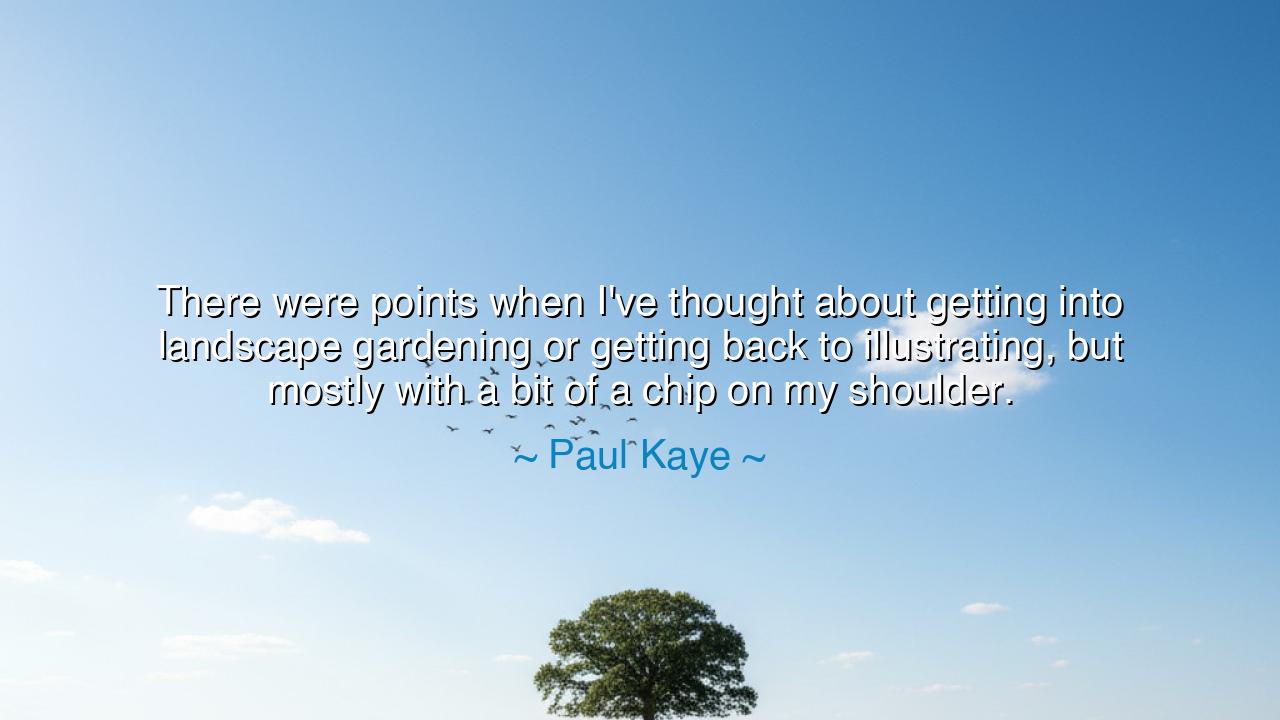
There were points when I've thought about getting into landscape
There were points when I've thought about getting into landscape gardening or getting back to illustrating, but mostly with a bit of a chip on my shoulder.






In the quiet struggle of the human spirit, there are moments when we find ourselves torn between the callings of passion and resentment. Paul Kaye, in his reflection, speaks of a familiar inner conflict: “There were points when I’ve thought about getting into landscape gardening or getting back to illustrating, but mostly with a bit of a chip on my shoulder.” These words reveal a profound truth about the tension that exists within us all—the desire to pursue something deeply meaningful, yet feeling burdened by past experiences or internal conflicts. The chip on the shoulder becomes both a barrier and a motivator, a weight we carry with us as we navigate our way toward fulfillment.
The notion of a chip on the shoulder is an ancient one, rooted in a feeling of discontent or a lingering sense of unfinished business. It suggests that there is something unsettled, a past wound or perceived slight that influences the choices we make. This lingering tension often keeps us from fully embracing what calls to us, for we are clouded by the weight of resentment or doubt. Yet, paradoxically, it also fuels the fire to prove something—to conquer what once eluded us, or to rise above the difficulties that have shaped us. The choice to step into the realm of landscape gardening or illustrating, as Kaye mentions, is not merely a decision about career but an attempt to reclaim a part of the self that feels overlooked or diminished.
In the ancient world, those who sought wisdom often found themselves facing similar tensions. Socrates, the great philosopher, wrestled with the conflict between the life of knowledge and the life of action. He questioned whether one could truly live in harmony with one's purpose without being weighed down by the demands of society or personal insecurities. He understood that the greatest wisdom came not in rejecting the world but in embracing it fully, despite the doubts and inner turmoil we may carry. Just as Socrates sought peace between thought and action, so too does Kaye's struggle reflect the conflict that exists within all who yearn for something more but are held back by unseen forces.
Yet, it is through the very struggle—the chip on the shoulder—that we often find the seeds of growth. History is filled with examples of those who have overcome the very burdens they once carried, transforming their frustrations into creative power. Consider the story of Leonardo da Vinci, who, despite his numerous personal and professional struggles, went on to become one of the greatest minds in history. Leonardo was often torn between his work as an engineer and his passion for art. He faced criticism, rejection, and self-doubt, yet he channeled these experiences into his work, producing masterpieces that continue to inspire the world. Da Vinci’s life teaches us that the inner conflict, the unresolved tensions, can be the catalyst for the most profound achievements.
Paul Kaye’s admission of a chip on his shoulder is not one of defeat but of recognition that our inner struggles are an integral part of our journey. They are the shadows that shape the contours of our potential. In the act of gardening, one does not merely plant seeds; one cultivates patience, resilience, and hope. Similarly, in the act of illustrating, an artist does not simply create images; they express their deepest emotions, their frustrations, and their triumphs. These creative pursuits are not about perfection, but about honoring the journey—the struggles, the mistakes, the growth that comes from acknowledging our imperfections.
Let us turn to the wisdom of the ancient stoics, who believed that adversity is the fertile soil from which the strongest character grows. Epictetus, the stoic philosopher, taught that it is not the external world that controls us, but our reaction to it. A chip on the shoulder, in this context, can become a source of strength. It becomes the force that propels us forward, that reminds us that the greatest challenges are often the most valuable teachers. Through acceptance of these internal conflicts, we can find a deeper sense of purpose, one that is not defined by our past but by the actions we choose to take today.
Thus, we must recognize the gift in Kaye’s struggle, for it mirrors the struggle of every soul who has ever sought meaning in the face of adversity. When the chip on your shoulder weighs heavy, do not retreat into bitterness, but embrace it. Let it drive you toward the very thing you fear, for it is in confronting that which we resist that we discover the greatest truths. Gardening and illustrating, or whatever your own pursuits may be, offer opportunities for transformation. In the tender act of nurturing a plant or the careful strokes of a brush, you may find the resolution to the conflict that has long burdened you.
So, heed the lesson of Paul Kaye: the struggles we carry are not to be feared but to be honored. Let them guide you toward your own creative endeavors. Choose to engage with the things that stir your soul, whether it be the earth or the canvas, even if you do so with a chip on your shoulder. For in doing so, you may find that the very thing that once held you back is the force that propels you forward into growth, healing, and fulfillment.






AAdministratorAdministrator
Welcome, honored guests. Please leave a comment, we will respond soon